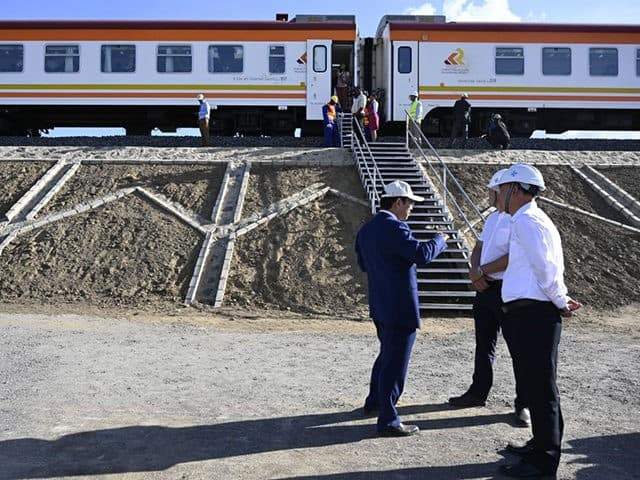Report: China May Lose $200 Billion in Belt and Road Africa Wing

China could lose about $200 billion from poor infrastructure investments in Africa amid the economic downturn caused by the Chinese coronavirus pandemic, Japanese financial newspaper Nikkei reported on Friday.
Through its Belt and Road Initiative (BRI), China promotes economically predatory infrastructure projects in developing nations to broaden its influence. In Africa, many expect China’s BRI investments to turn belly up amid the emerging economic recession caused by the coronavirus pandemic. In recent months, global supply and demand chains have been significantly disrupted as most countries around the world have essentially shut down their economies to comply with government-mandated lockdowns meant to curb the spread of the virus.
Demand for one of China’s main African investments, oil, has dropped drastically in recent weeks due to the coronavirus disruption, with the price of oil going negative for the first time ever. As individuals and big businesses are forced to halt activities, less fuel is used for both personal transportation and large cargo vehicles alike.
Africa — an impoverished continent facing some of the worst economic prospects in the world post-coronavirus pandemic, according to financial experts — will almost certainly see its nations default on their burdensome BRI loans.
China’s economic output fell 6.8 percent in the first quarter of this year, the Nikkei reports, adding that it seems doubtful that Beijing will have sufficient resources to fund African BRI projects in the future. As evidence, the report cites the absence of references in the communiques of recent political bureau meetings of the Chinese Communist Party (CCP) to BRI as a priority.
China views Africa mainly as a source of natural resources for the country’s growing demand in recent years. Beijing buys raw materials — such as oil, minerals, and metals — from Africa. China imports crude petroleum from Angola, Nigeria, South Sudan, and the Republic of Congo. In addition, China imports several minerals and metals from Africa, including iron and titanium from Sierra Leone; zinc and copper ore from Eritrea; and cobalt from the Democratic Republic of Congo.
China has committed nearly $200 billion in bilateral loans and FDI (foreign direct investment) in Africa through its BRI projects, according to the Nikkei.
It is likely that China could have paid the same — or less — for the raw materials, like oil and metals, it procures from Africa had it chosen to purchase them on the open market, the Nikkei article argued. According to the article, Beijing has invested in Africa hoping that more direct control of resources would provide greater security, but this has proven to be largely untrue, especially on a continent as insecure and volatile as Africa.
China’s own citizens have denounced the country’s BRI investments in Africa. In the fall of 2018, as dozens of African leaders prepared to fly to Beijing for a BRI summit with Chinese leader Xi Jinping, domestic criticism of the BRI projects in Africa made international headlines.
“Why is China, a country with over 100 million people who are still living below the poverty line, playing at being the flashy big-spender?” wrote Xu Zhangrun, an influential Tsinghua University law professor, in a critique of Xi in July 2018, as reported by the Los Angeles Times.
Another critic of China’s investment in Africa, Sun Wenguang, was arrested live on air by Chinese police as he voiced his concerns over China’s BRI projects during a Voice of America (VOA) radio show in August 2018. Sun, a retired university professor, criticized Xi’s spending in Africa on his show and argued that China was overlooking the poverty suffered by its own people.
As the police ripped him off-air, Sun could be heard saying, “Listen to what I say, is it wrong?”
“Regular people are poor, let’s not throw our money away in Africa … throwing money around like this doesn’t do any good for our country or our society,” Sun argued.
Photo: SIMON MAINA/AFP via Getty Images











